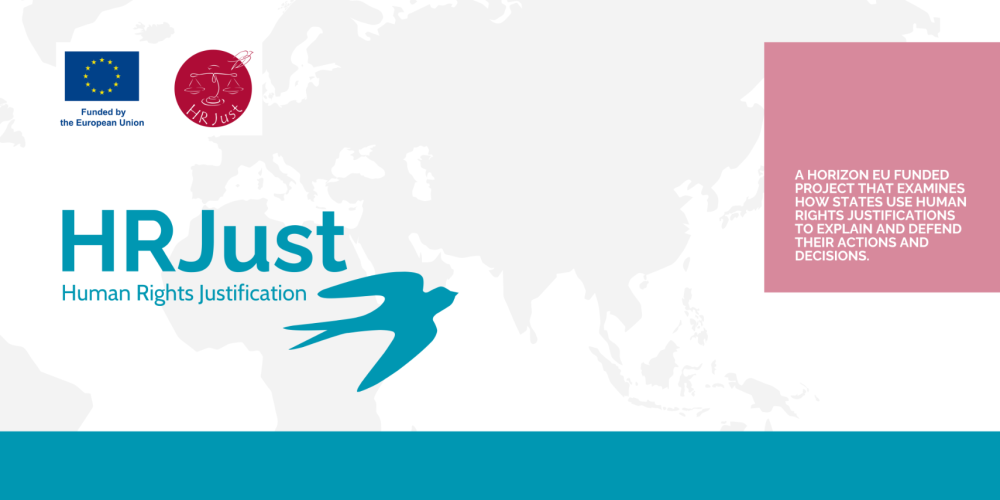States’ Practice of Human Rights Justification: a study in civil society engagement and human rights through the lens of gender and intersectionality (HRJust)
HRJust, A Horizon EU Funded Project, Examines How States Use Human Rights Justifications To Explain And Defend Their Actions And Decisions.

Human Rights Justifications (HRJ) are when States use human rights to justify decisions. Human rights regimes operate on the presumptions that only individual persons can be in possession of human rights. The regulatory gaps occurring when the States use HRJ for their actions are two-fold, one in the regulation of the States’ use of HRJ and one in the individual human rights protection when States use HRJ. This activity is not regulated by any international, regional or national regime. In other words, significant and important gaps in human rights regulations has now been identified, which this project seeks to address. We will develop a theory of HRJ and a process for Systematic Ongoing Civil Society Engagement (SODCSE) as a tool for a gender and intersectional inclusive Civil Society engagement. Through SODCSE, we will identify gaps in human rights regulations and protection, serving as underpinning data for our recommendations to EU in support of a multinational human rights system and promotion of transnational democratic governance. SODCSE will also help us identify geopolitical elements that influence States’ use of HRJ. This will be done through 5 countries: Sweden, Finland, Taiwan, India and Ukraine, through three actions: human rights dialogue, inclusive democratic participations, and protection of human rights defenders, and operationalised through three themes: Covid, Migration and Climate.
- Provider: Horizon Europe (European Commission)
- Project name: States’ Practice of Human Rights Justification: a study in civil society engagement and human rights through the lens of gender and intersectionality (HRJust)
- Registration number: 101094346
- Coordinator of the project: University of Gothenburg (Maria Grahn-Farley)
- Leader of the research team at IIR: Federica Cristani
- Research team (IIR): Federica Cristani, Jan Lhotský, Nikola Schmidt, Elif Naz Němec, Veronika Bílková, Petra Ditrychová
- Implementation period: 1. 3. 2023 - 28. 2. 2026
- Contact person / Senior project manager (IIR): Petr Burda (burda@iir.cz)
- Project's website you can find here.
- Project's social network here: LinkedIn
The European Commission's HORIZON-CL2-2022-DEMOCRACY-01 (Reshaping democracies) call aims to fund research and innovation activities in the field of democracy. Funded projects will contribute to support the European Union’s role in leading the transformation and defence of multilateralism by identifying and analysing policy avenues for a more robust, democratic and effective global governance. It should also develop policy recommendations, institutional frames, toolboxes, narratives and methodologies for supporting action towards transnational democracy.

Related centres
Centre for Governance of Emerging Technologies
The aim of the GET as a field of research is to explore the relationship between technology and international policy from an interdisciplinary perspective, from the theory of international relations, philosophy, and sociology to interaction with international law. Among the key research topics is cyber and space security, with an emphasis on planetary defense, asteroid mining, and the use of power lasers for a variety of space applications ranging from orbit cleaning to breakthrough interstellar travel projects. The Centre deals with activities ranging from basic theoretical research to policy-oriented work (e.g. the formulation of the emergence of an international security regime for the peaceful use of laser technology in space). Its members regularly inform the public in the media, organize public meetings and international workshops that combine technology development and political science, publish policy papers and/or act as experts in addition to carrying out diplomatic missions to the UN and other international organizations.
Centre for International Law
The CIL conducts research in various areas of International Law with the main emphasis being on human rights, international humanitarian law, international criminal law, the use of force, the fight against terrorism and the theory of international law. The results of the Centre's activities are both professional publications and policy-oriented studies. The studies should help the Ministry of Foreign Affairs of the Czech Republic to formulate its legal position. These studies are also intended to provide information on international law to the public and the media.
